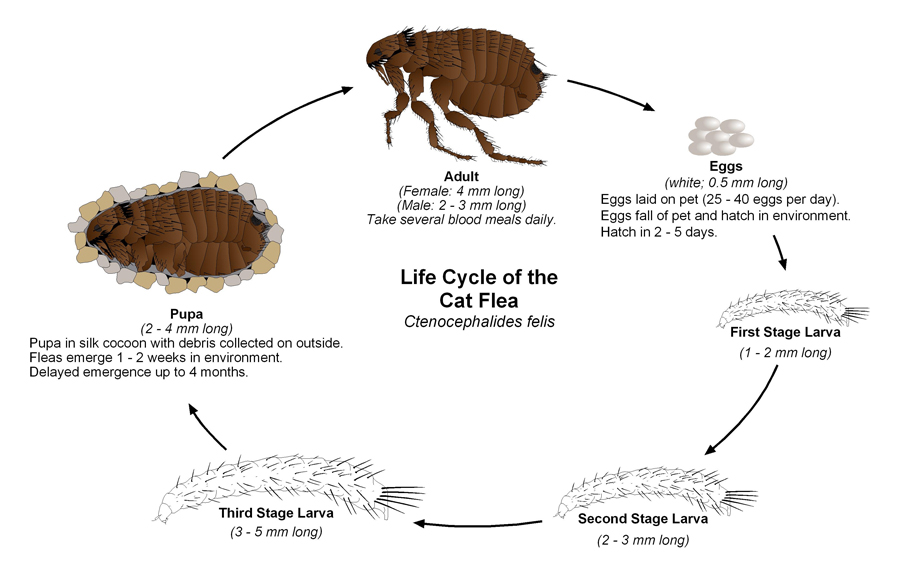Flea control for a flea-free future
August 4, 2019
General Information
- Fleas bite both dogs and cats and are passed back and forth between these animals. Besides causing severe itching, fleas can transmit parasites such as tapeworms.
- If one dog or cat in a household has fleas, it should be assumed that all dogs and cats in the household have fleas. Therefore, all animals in the house and yard must be treated to control the infestation.
- Fleas spend a large amount of their time on the pet both feeding and laying eggs. The eggs fall off the pet and contaminate the home environment. These eggs will hatch quickly, leaving a constant supply of fleas in your house. In just 4 weeks, a single pair of adult fleas can produce an infestation of more than 6,000 eggs, larvae, and adults!

Flea Allergy
- When a flea bites your pet, it injects a small amount of saliva into the skin. Many animals are allergic to this saliva. In highly allergic animals, the bite of one flea can initiate severe itching that lasts for days past the time of the actual bite.
- Biting and scratching around the rump and groin area are the most common signs of flea allergy. “Hot spots” (bare, eroded, oozing skin patches) often occur secondary to flea allergy. Fleas may be hard to find, they can be ingested while grooming or drop off into the environment. The presence of flea stool (called flea dirt) on an animal confirms flea infestation.
- Successful treatment of flea allergy requires absolute elimination of fleas from contact with the affected dog or cat.
Flea Control Information and Precautions
- Because of the life cycle of the flea, you should treat all pets to control the infestation.
- Shampoos and sprays cannot effectively kill flea eggs. These products kill only adults and pre-adults. Therefore, treating your pet only until fleas are no longer seen will not completely resolve the problem. The eggs will remain alive and hatch into a new crop of fleas in a few days to weeks. Occasionally, some eggs lay dormant for several months, so treatment that affects eggs is very important. Shampoos are rarely used anymore except for very young animals.
- Newer oral systemic flea/tick control products for dogs have excellent efficacy against adults AND eggs. They are very safe and can often get a home flea-free within a few short months by disrupting the life cycle of the flea.
- Topically applied residual products are also good for providing residual protection on the pet and can also affect the life cycle of the flea.
- Most products are safe to use. Occasionally pets may develop vomiting or diarrhea with oral medications and skin reactions to topical products. Please let us know if you see any adverse reactions.
Control in the house
- Vacuum thoroughly, especially in cracks, crevices and areas where pets sleep. Throw out vacuum cleaner bag. Wash dog beds regularly.
Control For Your Pets
There are several options available to treat and prevent the recurrence of fleas. Never use any canine product on your cat. Read the label to be sure it is safe for young pets. It is best to use products recommended by your veterinarian.
- NexGard®: Oral monthly systemic chewable medication that controls fleas and will kill adult fleas and prevent eggs from hatching. Very safe. Only for dogs.
- Frontline Gold®: Topically applied product. Dogs and puppies over 8 weeks of age and Cats. Kills all fleas within 24 hours. Recommended to apply monthly for control of ticks and fleas. Normal bathing of your pet will not reduce effectiveness, however, do not bathe your pet for 24-48 hours before or after application. Will kill fleas on dogs for 8 weeks, and 6 weeks for cats.
- Revolution®: Topically applied monthly product. For use on dogs, cats and kittens as young as 6 weeks of age. Controls fleas, heartworm disease, ear mites and intestinal parasites.
- Capstar®: Oral tablet. Will kill fleas within hours. No residual effects. Can be used in 4 week old puppies and kittens if at least 2# in weight.
- Others: If your pet cannot utilize one of these products, we can help find a substitute that may be more suitable for your pet’s unique needs.
